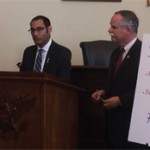The second session of the 113th Congress gets underway this month and members are returning to much unfinished business. One of the first things Congress will need to address is raising the debt ceiling. In order to avoid another government shutdown, Congress must vote to extend our borrowing capacity by February 7. As Congress returns to work, the ACR will work with congressional leaders and other key lawmakers to address pressing issues affecting the rheumatology community, including:
Physician Payment Reform
In December 2013, Congress passed a three-month deal that averted the massive payment cut scheduled for January 1 and extended the deadline for addressing the Sustainable Growth Rate (SGR) formula to March 31, 2014. Meanwhile, the House Ways and Means and Senate Finance committees also passed legislation last month to permanently repeal the SGR and install new payment programs. Both chambers are expected to begin consideration of the bills when they reconvene. The greatest challenge lawmakers may face as they consider the legislation in 2014 will be providing a way to pay for repeal on both bills. The Congressional Budget Office recently decreased the estimated cost of repeal to $116.5 billion; however, they scored the Finance committee bill at $148 billion. The ACR will continue to work closely with congressional staff and provide specific input as SGR repeal legislation is refined and efforts move forward.
Patient Access to Treatment
The Patients’ Access to Treatments Act, H.R. 460, was introduced again in the 113th Congress by Representatives David McKinley (R-WV) and Lois Capps (D-CA). This legislation limits patient cost sharing for medications in a specialty drug tier to the dollar amount a plan requires for drugs in its highest nonpreferred brand drug tier. At the end of 2013, the bill had 85 bipartisan cosponsors in the House of Representatives. The ACR continues to work with other members of the Coalition for Accessible Treatments to secure sponsors for companion legislation in the Senate. As support for H.R. 460 increases, we are optimistic that it could receive a hearing in the House Energy and Commerce committee this year.
Funding for Medical Research
Funding for medical research improves lives, creates jobs, reduces healthcare costs, and contributes to local economic growth. When the across-the-board sequestration cuts took effect on March 1, 2013, the National Institutes of Health (NIH) suffered debilitating cuts in funding. Another year of flat or reduced funding would exacerbate the current crisis and delay progress toward life-saving research, better prevention strategies, and new treatments for arthritis and rheumatic diseases. Therefore, the ACR continues to advocate for increases in the NIH budget, with a goal of at least $32 billion in funding for FY2014.
Implementation of ICD-10
In 2013, legislation was introduced in both the House and Senate to prohibit the implementation of ICD-10 on October 1, 2014. While the ACR supports this legislation, CMS is adamant that implementation will proceed as scheduled. The ACR is particularly concerned that the Centers for Medicare and Medicaid Services (CMS) does not plan to conduct thorough end-to-end testing of ICD-10 prior to its launch. Failure to perform comprehensive testing of the complete claims processing system may result in an overwhelming backlog of claims, delaying payments to providers and disrupting access to care for patients. The ACR continues to urge CMS to conduct thorough external testing of the system prior to its launch, pushing back the implementation date to allow for additional time, if necessary. We will also renew the appeal for Congress to intervene if CMS fails to expand testing and ensure the system is functioning properly.
For questions and additional information, please contact the ACR Government Affairs staff at (404)633-3777 or [email protected].
Your involvement is critical to achieving successful policy outcomes for all important issues facing the rheumatology community. Visit www.rheumatology.org/advocacy to learn about the ACR’s advocacy efforts and how you can help.
